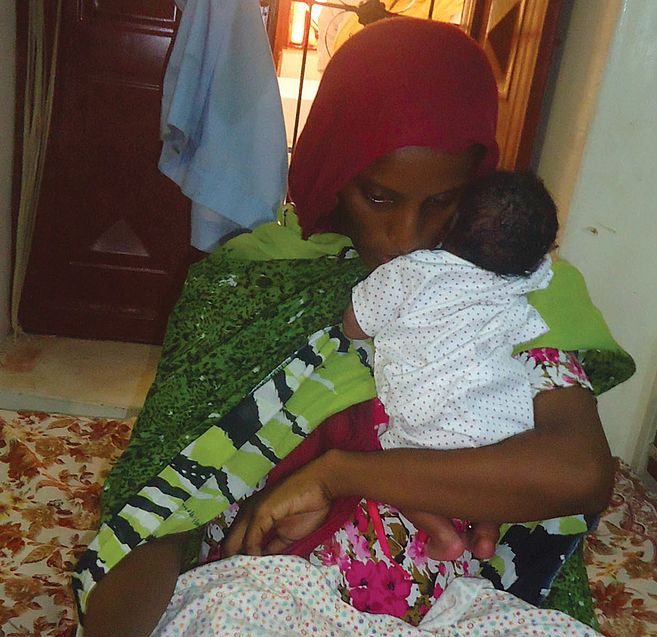
Woman sentenced to death and lashing in Sudan for her religion in 2014 argues her case before Africa’s main human rights body
REDRESS and four other human rights organisations have submitted their arguments on behalf of Mariam Yahia Ibraheem and her family in a complaint against Sudan pending before the African Commission on Human and Peoples’ Rights. Mariam, a devout Christian, was sentenced to death for apostasy and corporal punishment of 100 lashes for adultery in 2014 in Sudan because, as a Christian woman and the daughter of a Muslim man, she married a Christian man.
The organisations argue that Sudan has breached several fundamental rights of Mariam and her family, recognised by the African Charter on Human and Peoples’ Rights, which Sudan accepted in 1986, including freedom of religion and freedom from torture and ill-treatment.
Mariam was born to a Sudanese Muslim father and an Ethiopian Christian mother, but her mother raised her as a Christian without her father being present in their lives. However, the Sudanese judiciary concluded in 2014 that she was a Muslim, despite her having practiced as a Christian her whole life, on the basis that her father, whom she had not seen since she was just six years old, was Muslim. Thus, according to the judiciary, her marriage to a Christian man was void, and its consummation amounted to adultery.
Mariam was arrested with her Sudanese American husband in Khartoum in 2013, following a complaint submitted by someone who alleged to be Mariam’s paternal brother. It claimed that she had committed adultery because of her marriage to a Christian man. In February 2014, the Court added the additional charge of apostasy, which in Sudan carries the death penalty. In May 2014, Mariam was convicted of adultery and apostasy. Her husband was acquitted of his sole charge of adultery. The judge ordered Mariam to recant her Christian faith within the next three days, on pain of executing the sentence, but she refused and appealed her conviction.
Mariam was detained while being pregnant, together with her infant son, and following her birth, with her newborn daughter, in inhuman conditions in Omdurman’s Woman Prison for over four months. She was forced to give birth in prison while in shackles, without basic medical care, causing her long-lasting health problems. Prison guards routinely beat her with sticks, kicked her, spat on her face, and insulted her. She was also abused by fellow inmates and imams whom she was forced to meet with.
In June 2014, the Court of Appeal revoked her conviction, based on Mariam’s alleged mental status, not exonerating her of either the apostasy or the adultery charges. Mariam and her children were released from prison, but due to ongoing threats, she and her family had to seek refuge at the Embassy of the United States in Khartoum. They were forced to flee to the United States as refugees in July 2014, leaving all her possessions behind, where they have lived since.
The complaint has been brought on behalf of Mariam, her husband and their two children. In it, they seek a number of remedies from Sudan, including a prompt and impartial investigation of her arrest, detention, conviction and sentencing, and a public apology from Sudan for the violations suffered.
The four organisations who have brought the complaint together with REDRESS are the African Centre for Justice and Peace Studies (ACJPS), the Sudanese Organisation for Development and Rehabilitation (SODR), the Sudanese Human Rights Initiative (SHRI) and the Justice Center for Advocacy and Legal Consulting (JCALC). The law firm Three Crowns assisted pro bono in preparing the merits submission.
“No Sudanese man or woman should ever again have to go through what I had to go. I was heartbroken to meet many other people in prison whose stories were similar to mine. They were there not because they had committed real crimes, but simply because, like me, they were also Christians,” said Mariam Yahia Ibraheem.
Several REDRESS reports have highlighted the discriminatory application of the law in Sudan for decades, which has had a negative impact on women. Our report Criminalisation of Women in Sudan: A Need for Fundamental Reform shows how public order laws designed to protect morality, disproportionately targeted women, who could face long spells in jail and flogging for infractions such as wearing trousers.
“This case highlights the biases against women that still persist in the Sudanese legal system, showing the need for urgent legislative and policy reforms that fully protect Sudanese women from discrimination and violence,” said Alejandra Vicente, Head of Law of REDRESS.
Last year, the transitional Sudanese government repealed the public order laws which had governed women’s presence in public spaces, resulting in arbitrary arrests and ill-treatment, but Sudan still needs to reform other aspects of the public order regime that have a discriminatory effect on women. This includes abolishing the public order police, repealing the crime of apostasy and abolishing corporal punishment from the criminal code. Sudan must also ratify the UN Convention against Torture and the Convention on the Elimination of all Forms of Discrimination Against Women to fully commit to the protection of the rights of women in the country.
Read more about the case here.
For more information or an interview, please contact Eva Sanchis, REDRESS’ Head of Communications on +44 (0) 207793 1777; +44 (0)7857 110076 (out of hours) or on [email protected].
Photo credit: AFP via Getty Images.
